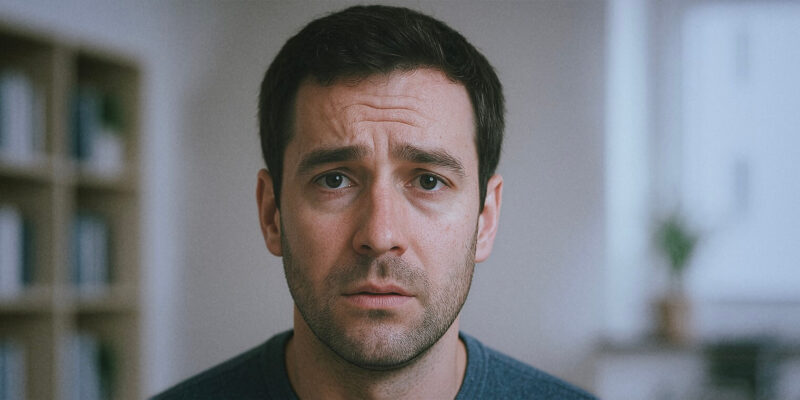Chronic worry is like a snowball that quickly becomes an avalanche: If you don’t deal with it when it’s small, it will consume you.
This means the key to managing chronic worry is to deal with it as soon as it pops into mind and is still manageable—before it spirals into something huge and overwhelming.
Sure, that sounds nice, but how? My worries go from annoying to overwhelming faster than a Ferrari!
While the long-term solution to chronic worry and anxiety is building better habits, there are some small tips and tricks that can help in a pinch. And one of the best ways to short-circuit your worries is with mantras.
Mantras are short, memorable sayings that help remind you of your values—what really matters to you.
Here are 5 tiny mantras that will help you avoid spirals of worry and anxiety so you can stay focused on the present moment with calm and confidence.
I am not my thoughts
Worry becomes overwhelming when you over-identify with your thoughts.
For example:
- You feel anxious and afraid because the thought crossed your mind They all see through me. I’m such a fraud. You assumed that your thought was correct and made a judgment about yourself based on it.
- You feel nervous because you start worrying that Janie hasn’t called yet. That’s weird. Something terrible must have happened to her! You assumed that your thought was true and made a judgment about the future based on it.
In both cases, the mistake is the assumption that your thoughts are always saying something true and meaningful about you or the world. But thoughts aren’t truth. In fact, they’re frequently dead wrong and unhelpful.
When you get in the habit of reminding yourself I am not my thoughts you create separation and distance between a particular thought and the reality of who you are and how the world works. This then makes it easier to disengage from unhelpful and anxiety-producing thoughts like worry.
Just because it feels bad doesn’t mean it is bad
Your brain’s fear center is designed to keep you safe from dangers and death. It’s like the alarm system for your body. But just like your car alarm or fire alarm, your brain’s fear center can experience false alarms—situations where your brain thinks something is dangerous when it isn’t. And the result is lots of unnecessary anxiety and worry.
For example: You just got off a long Zoom call with your team from work and you notice that you’re tense and pretty stressed. And come to think of it, the section of the meeting where you talked didn’t seem very well-received by your coworkers: I wonder if they thought I was too anxious? Immediately, your brain (thinking there’s something dangerous out there) starts flooding you with worries: Why am I always so anxious and nervous in meetings?! People must think I’m a basket case… This is why I never get promotions… Ugh, I hate that I’m so anxious—why can’t I just be strong and not worry so much?! Now, you’re really feeling anxious and stressed.
What happened here is that you assumed that because you felt a little tense and stressed after the meeting you were anxious during the meeting and that that was a really bad thing. In other words, by elaborating on your worries, you effectively told your brain that you feeling stressed and anxious was dangerous. And what does the brain do when it thinks something’s dangerous… It releases a whole bunch of adrenaline (which makes you feel more anxious) and starts peppering you with worries and worst-case scenarios (which makes you even more anxious).
The key to a well-functioning personal alarm system is to teach your brain that not everything that appears dangerous actually is dangerous. So, if you can remind yourself that just because it FEELS bad doesn’t mean it IS bad you’ll be able to calm your worried brain and not fall into major cycles of worry and anxiety.
There’s nothing wrong with feeling a little anxious or stressed sometimes (especially after something inherently stressful like a 90-minute Zoom meeting!). When you remind yourself that just because it feels bad doesn’t mean it is bad you help keep your brain calm instead of anxious.
Less but better
One of the biggest triggers for chronic worry (and all the anxiety it produces) is feeling overwhelmed:
- You have so many items on your to-do list that you don’t even know when to start.
- Your schedule is so packed full of meetings that there’s no time to get actual work done.
- Your husband’s peppering you with questions about the new house, your three kids are hanging all over you asking for stuff, and on top of that, your mother-in-law’s calling AGAIN!
This means that one of the best ways to not worry so much is to avoid getting overwhelmed in the first place.
Sure, sounds easy. But overwhelm just happens!
True, some overwhelm in our lives is probably inevitable. But you probably underestimate your ability to manage it better.
Because we’re a culture of doers and action, our default is to say yes to things and always take on new things. Combine this with a natural tendency to want to be nice and please others, and we often end up with way more on our plate than we intended.
The solution is to remind yourself of a very simple idea: Less but better
This little mantra is powerful because it’s not just about saying no, which feels kind of negative. It’s about reminding yourself that by saying no to some things strategically, you’ll actually be getting a better experience overall:
- Instead of saying yes to every request any coworker makes of you, you prioritize and only say yes to the essential requests—the ones that actually move the needle.
- Instead of saying yes to every little request your kids make of you, you practice saying no to many of them so that you can be really present when you do say yes.
Less but better.
In gentleness, strength
For many people, worry and self-criticism go hand-in-hand with each other:
- As soon as you start worrying about something you’re already beating yourself up: God, why am I such a worrier?! I really need to get my sh!t other and stop getting so lost in my own head.
- Your immediate reaction to being overly critical and judgmental of yourself is to start worrying: Will I always be like this? Am I passing on my worry and low self-esteem to my kids? Will they still want to be around me if they knew how insecure I was?
Unfortunately, worry and self-criticism only amplify each other and make it more likely that you get lost in a major avalanche of anxiety.
But the good news is, if you can put even a small dent in your habit of self-criticism, you’ll find it’s a lot easier to break out of worry.
The little mantra I use and have found very helpful is this: In gentleness, strength.
It reminds me that, at least when it comes to matters of the head, being strong in the sense of trying harder and forcing things to be different, only makes things worse. On the other hand, when we’re gentle with ourselves—including with our worries and insecurities—it actually becomes easier to move past them and get on with life.
Focus on the person, not the problem
At the end of the day, much of our worry and anxiety is related to other people and our relationships with them. And nothing sets off the worry habit like interpersonal conflict:
- You got in a disagreement with your manager and spent the rest of the afternoon worrying about the consequences.
- You and your spouse had a blow-up fight last night and you’ve been worrying about how awkward it’s going to be later today. Or maybe, whether you’ll end up in another big fight again…
And it’s true: You’re just way more likely to end up worrying after conflict with other people. The trick is to get better at managing that conflict so that it’s less worrisome after the fact.
And while there are tons of things that lead to and exacerbate interpersonal conflict, there’s one technique that’s almost always helpful for keeping conflict to a minimum and therefore having less to worry about after the fact:
Focus on the person, not the problem.
Obviously, most conflicts arise because of some problem. So our natural tendency is to try and fix the problem right away. But this is usually a mistake because, like it or not, interpersonal problems usually require that you work together with the other person to solve it.
But how can you effectively work together with the other person if you don’t give any consideration to the other person and make sure you’re starting from a good place together?
The mantra Focus on the person, not the problem will save you a lot of unnecessary worry, stress, and anxiety by reminding you to solve interpersonal problems the right way: together.
Instead of jumping into the problem and all your brilliant ideas for fixing it right away, take a moment to consider the other person: ask them what their read on the problem is, genuinely consider that, brainstorm different ways you might approach the issue, etc.
Ironically, you’ll be much more likely to solve the problem well when you focus on the person first, not the problem. And you’ll have a lot less to worry about after the fact!
All You Need to Know
If you want to free yourself from chronic worry and anxiety, the secret is to learn how to catch it early and disengage. These 5 mantras will help you do just that:
- I am not my thoughts
- Just because it feels bad doesn’t mean it is bad
- Less but better
- In gentleness, strength
- Focus on the person, not the problem





7 Comments
Add Yourswhat is none of these apply?? “Less is better”, maybe. Some of us have real worries about much larger issues – unemployment, inflation, aging, health, isolation,…. Can’t eliminate these issues so problem solving/worrying go on and on.
Hey Laurie,
I think this is probably a definitional difference. All those things you listed are very real concerns, for sure.
The key differentiator, for me, is whether thinking about them is helpful or not. If it is, then I’d call it problem-solving, planning, etc. But ifthe thinking isn’t helpful, then I’d call it worry.
That’s not to downplay the significance of those concerns—but to highlight the important difference between helpful and unhelpful thinking about difficult things.
Hi Nick. Great article as always. You mentioned that when your brain starts releasing all these stress hormones when it thinks you are in danger( when it was a conflict you had with someone) for me my reasoning brain is basically offline and I can reason all I want but that’s not going to stop the stress response it’s already started. So what can one do that doesn’t involve more thoughts and reasoning?
Nick – outstanding article. Your practical psychological tips offer great insights. As you know, I incorporate many of your ideas into training in the non profit I started where we teach under-served teensager about mindset and self-leadership skills. Some of these points will be added to what we teach. Thank you Fred
all your articles help so much to expand on all i learned in mood mastery. this little gem – The little mantra I use and have found very helpful is this: In gentleness, strength. thank you nick!
Love to hear that, Suzanne! So glad it’s helpful 🙂
Awesome article using your tips to help domestic abuse survivors that I treat!